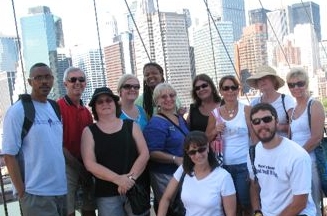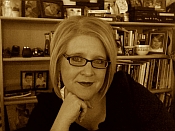Reading, Writing, and Teaching the Holocaust: Cultivating the Humanitarian Hope Amidst Tales of Catastrophe
In July, McCool Junction teacher Danielle Friesen-Bethune was selected as one of 20 Rural Sites Network teachers to participate in the Memorial Library Summer Seminar on Holocaust Education in New York City: “Reading, Writing, and Teaching the Holocaust.” The seminar, led by New York City Writing Project co-founder Sondra Perl was held at the Holocaust Memorial Library in Manhattan. Teachers heard from Holocaust survivors Gisela Glaser and Irving Roth. They visited the Museum of Jewish Heritage: A Living Memorial to the Holocaust. Participants wrote intensely, presented Holocaust lessons, explored identity, studied Judaism (what does it mean to be a Jew?), discussed how to turn learning into action, and participated in a traditional Shabbat celebration.
How it transformed my classroom…
As a rural teacher, I constantly search for opportunities to transcend the inherent educational barriers presented by the homogenous pockets in which we teach. I attended this seminar with the goal of expanding the walls of my classroom, and this past August my juniors began a collaboration with students from Missouri. Both groups read Elie Wiesel’s Night, viewed the PBS film God on Trial, and shared discussions through a blog. They were able to see another person’s perspective and openly share their thoughts. The blog “Breaking Down Barriers” was a new and rewarding experience for all involved. Questions that stimulated the most profound responses were about the necessity of faith, the existence of God throughout the Holocaust, and the hope for identity after such an assault.Classroom
I also created an elective course entitled Holocaust Literature. The reading includes The World Must Know, TheFive Chimneys, The Book Thief, and The Sunflower. Another focus of this course is turning learning into action.In November and December, students sponsored a food drive. In April, students will be collecting infant and children’sitems such as diapers, baby wipes, and other necessities not offered through Nebraska’s WIC program. The York News Times highlighted this project in a recent article that was featured on the National Writing Project’s site (“Nebraska Kids Turn Despair to Hope”). I also participated in a live webcast with EdTechTalk and Teachers Teaching Teachers (“Teachers on a Journey”). This hour-long discussion highlighted the work of a few teachers who have been active in the Holocaust Educators Network.
How it transformed me…
At the conclusion of the seminar we were asked to write a final reflection but mere words proved inadequate. Honestly, how does one reflect upon a life-changing experience? What words and phrases will seem sufficient? As I look back on it all now, certain images come to mind — all of the firsts — taxis, the subway, Broadway shows, meeting Jewish people, Shabbat. However, what stands out most are the emotions of it all. I experienced the kaleidoscope of human emotions — from sorrow and grief, to exhilaration and hope. When all was said and done, I left the seminar a changed person. This experience shifted my views on life — it made me a stronger teacher, a more generous person, a mother with increased patience. Likewise, it has increased my passion for living, for educating, for learning.
Journal Excerpt…
The Journal Excerpt was written after an emotional afternoon going through the Museum of Jewish Heritage: A Living Memorial to the Holocaust. One room made me more emotional than all the others – Children of the Holocaust. One part of it was filled with pictures of children in concentration camps, being tortured, and the specific photo that made me stop to take notice was one of a dying Jewish boy in the middle of the street as other Nazi youth walked past him, laughing. The other part of the room was filled with pre-war family photos of victims – smiling faces, content families, a room of hopes and dreams that would never be.
Emotions are not deliberate. Despite my greatest effort, emotion cannot be controlled, is impossible to harness. At moments there is a bubbling up of something that must escape, it cannot be held down.
I did not intend to cry. I saw the dying boy in the street as the others walked past him and I simply couldn’t. I heard the story of mothers throwing their children to the outstretched arms of strangers. I saw the hope in the eyes of parents as they looked lovingly upon their new child. I could not control the tears. The more I fought, the more they persisted. I, physically, needed to grieve for this assault of inhumanity. I did not intend to cry, but that is what I did.
In the purging of sorrow my body became drained, numb. I was left exhausted and unable to continue trying to make sense of it all.
Poem excerpt…
This poem is an excerpt of a longer poem that I wrote at the conclusion of the seminar. I wanted to show the brutality and horrors of the Holocaust juxtaposed against our necessity to teach it – to tell the stories.
Sing for the child alone in a sea of corpses, calling for his mother.
Let your song blend with his desperate cries.
Allow the music on your lips to envelop his thin, naked body.
Sing until he is calm.
Hum the melody of a child’s song as he kneels beside his mother’s cold body.
Watch as he rests his head upon her breast.
See as he closes his eyes.
Feel as his spirit dies in a sea of ashes and flesh.
Breathe his last breath.
Walk forward with his story upon your lips.
Close your eyes, envision his life that will never be.
Find solace in your ability to speak.
Tell all of his song – screams stifled by hatred.
And always. . .sing for the child of the sea.
Additional Press…
The Riverdale Press interviewed participants while in New York (“Holocaust History Brings Rural Educators toTears”).


Referenced Links
“Holocaust History Brings Rural Educators to Tears” to
http://www.riverdalepress.com/atf.php?sid=5218¤t_edition=2008-07-17
“God on Trial” to http://www.pbs.org/wgbh/masterpiece/godontrial/index.html
“Breaking Down Barriers” to http://www.mccoolmiller.blogspot.com/
“Nebraska Kids Turn Despair to Hope” to http://www.nwp.org/cs/public/print/resource/2757
“Teachers on a Journey” to http://edtechtalk.com/taxonomy/term/1625
“Holocaust Educators Network” http://www.holocausteducators.org/
About the author: Danielle Bethune

Danielle Friesen-Bethune is in her seventh year of teaching secondary English at McCool Junction Public School. In addition to English, she teaches Newspaper and Holocaust Literature. She is the Drama director, Speech Team coach, Junior Class/Prom sponsor, McCool Education Association President, and McCool Community Club treasurer. Danielle and her husband, Craig, have three children–Cameron (8), Rheagan (4), and Kinsleigh (2). Danielle graduated from Henderson Community School, earned her bachelor’s degree from the University of Nebraska-Lincoln, and is working toward her master’s degree in Instructional Technology at the University of Nebraska-Kearney.
Danielle has been involved with the Nebraska Writing Project since 2003 when she took the Rural Institute in Juniata. She has also been involved in the NeWP Leadership Institutes in Aurora (Level I & II), was on the RSN Teacher Inquiry team in 2005-2006, presented at the Rural Institute in North Platte in 2006, was on the committee that organized the Ted Kooser Poetry Event/Celebration in 2007, and has received three mini-grants from NeWP.
In March, Danielle will be presenting her work with the Holocaust at the national Rural Sites Network Conference in Kalamazoo, Michigan.
